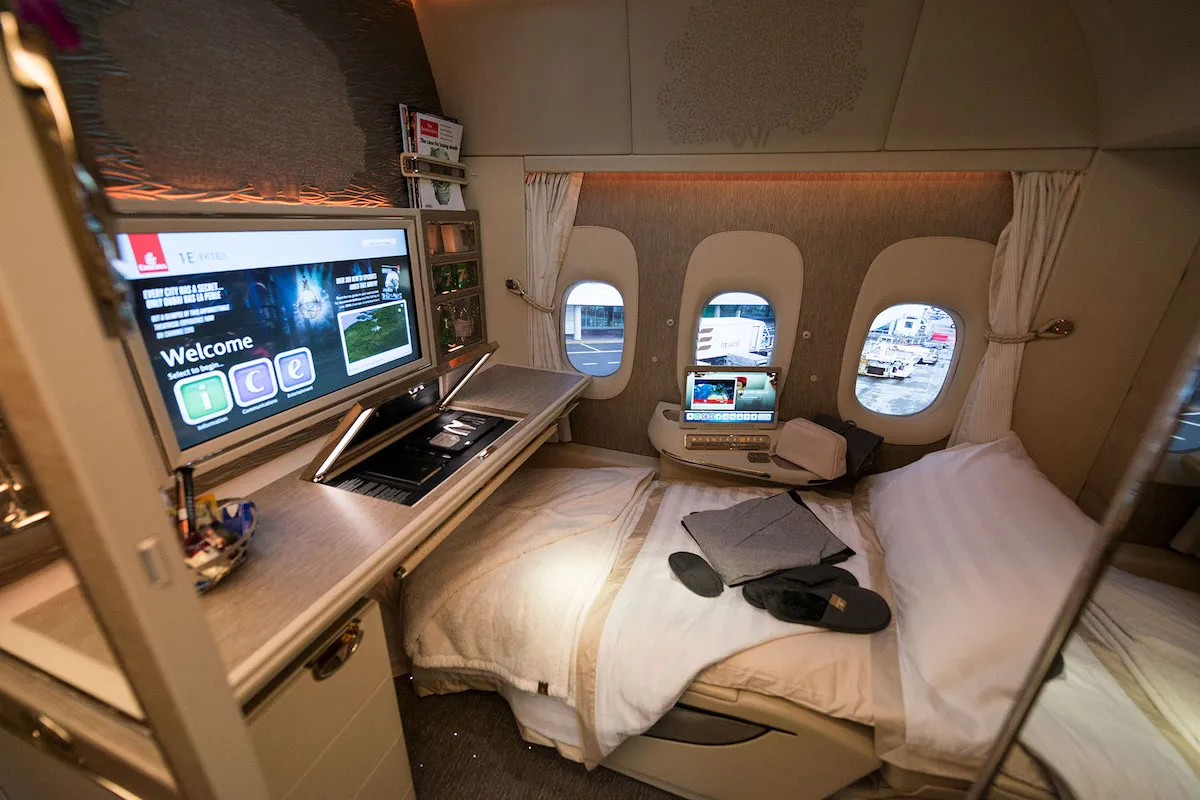Skift Take
First class on long, intercontinental flights is slowly disappearing at most airlines. But not everywhere, with Emirates and Lufthansa keeping the posh offering.
First class travel is not going anywhere despite recent moves by several airlines to cut the posh seats from planes that fly long, intercontinental routes.
“It remains hugely important to us,” Emirates President Tim Clark said at the annual meeting of aviation trade group the International Air Transport Association (IATA) in Istanbul Tuesday. More than 80 percent of the Dubai-based carrier’s 250-plus airplanes is outfitted with the luxury product, and plans are in the works to further “refine” it, he added.
Clark’s comments come days after Qatar Airways CEO Akbar Al Baker told Bloomberg his carrier would not install first class seats on its next generation of long-haul aircraft. Al Baker indicated that the airline’s business class seats were sufficiently luxurious and generated greater returns on investment for the airline.
Long-haul first class – or turning left when you board a widebody jet as many frequent fliers know it – is a gradually disappearing product. Most global airlines agree with Al Baker that the investment is often not worth the cost, especially as business class seats have improved. The last U.S. airline with the product, American Airlines, said last year that it would be remove the premium offering on its last long-haul plane’s with first class over the next few years years. Air New Zealand, KLM, Latam Airlines, and United Airlines are among the ranks of global carriers that no longer offer long-haul international first class.
To be clear, the first class seats in question are the lie-flat, often suite products on international flights, and not the standard first class recliner seats offered on shorter flights in many domestic markets. That product continues to be widely offered and invested in by airlines.
First Class For Long, Long Haul
Even as some airlines are removing the poshest offering from their planes. Others are investing in it, at least for their longest flights.
Qantas Airways will unveil a new first class offering on the Airbus A350 flying its Project Sunrise ultra long-haul flights to London and New York set to begin in 2025. Travelers in the six-passenger cabin will be treated to a separate seat from their beds among other amenities. But Qantas would not offer the product if it did not see a financial return.
Vanessa Hudson, Qantas chief financial officer and incoming CEO, said Monday that travelers are at a baseline willing to pay roughly 20 percent more for the airline’s nonstop to London from Perth, than they will for connections over Dubai or Singapore. And premium seats cost more on top that. Qantas expects the new nonstops to generate $266 million (A$400 million) in additional incremental annual revenue.
And Lufthansa will rollout its own new first class offering in the fourth quarter as part of a larger cabin upgrade program, known as Allegris, for its fleet of widebody jets. The Allegris products will also be installed on large planes flown by fellow Lufthansa Group carrier Swiss Air.
“I’m in the job now nine years. Every year, I’ve been confronted with the fact that our first class is over dimensioned, and we should reduce the size,” Lufthansa Group CEO Carsten Spohr said in May. “This year is the first year, all my team tell me as for, we need to grow first class. It’s under dimensioned. I never thought I would ever hear that.”
The investments are, in part, driven by the surge of premium leisure travelers since the pandemic. The trend has been noted by airline executives on both sides of the Atlantic, from Delta Air Lines to Finnair and Lufthansa. Each carrier, however, is taking a different approach to how to capture this lucrative and growing segment of travelers. While Lufthansa is investing in first class and its other premium products, Delta and Finnair are doubling down on better business class and premium economy seats.
“The investment in the new product, it outperforms the old product,” Finnair Chief Commercial Officer Ole Orvér said in Istanbul. “We see that in the revenue side.”
While Finnair no longer offers long-haul first class, it launched a $228 million upgrade to its business class and premium economy offerings last year. The investment was in part about capturing more premium leisure travelers that Orvér said at the time was an increasingly important market segment for the carrier. This is especially true given Finnair’s need to radically restructure its business — long built on connecting East Asia and Europe — following the closure of Russian airspace.
Premium economy is widely viewed as some of the most profitable real estate aboard widebody jets. These seats, while more comfortable than standard economy ones, take up a fraction of the space of a lie-flat business class seat yet command in many cases more than double the economy fare.
The Daily Newsletter
Our daily coverage of the global travel industry. Written by editors and analysts from across Skift’s brands.
Have a confidential tip for Skift? Get in touch
Tags: airlines, business travel, emirates, first class, lufthansa, paxex, premium leisure, qantas, qatar airways
Photo credit: Emirates plans to further "refine" its first class product in the coming years. Emirates
